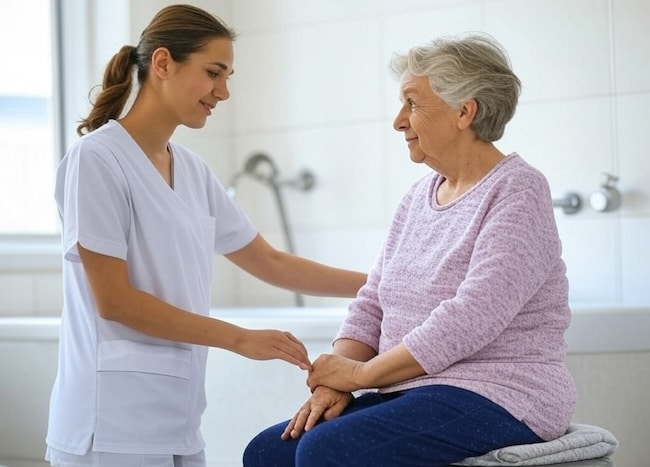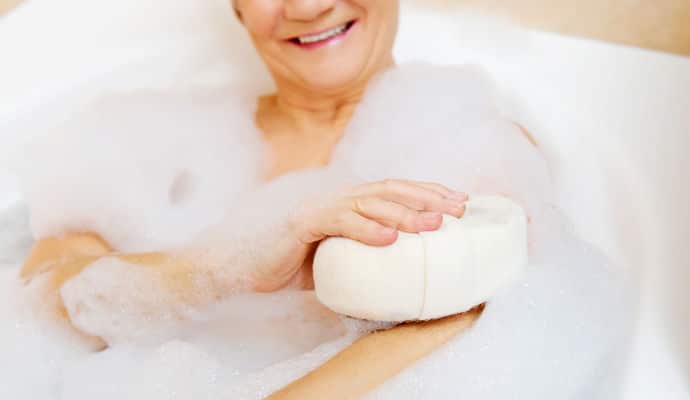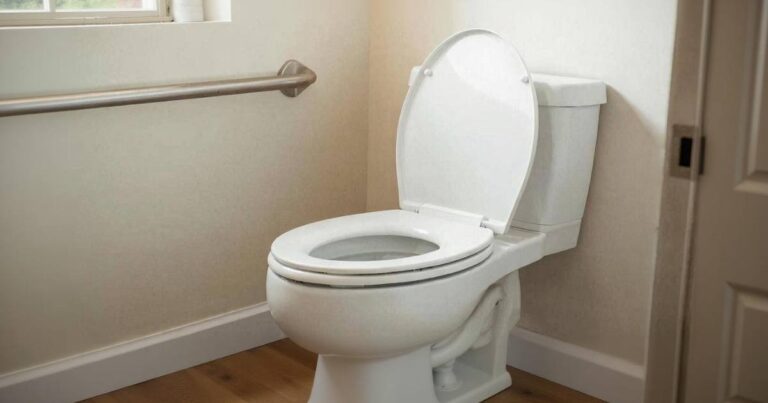As we age, bathing routines often need to adapt – but how much is too much, or too little? While daily showers might have been the norm earlier in life, the skin of an elderly adult becomes thinner and drier, making frequent bathing difficult (if not harmful).
Striking the right balance is crucial: excessive washing can lead to irritation and infections, while insufficient washing can cause hygiene-related health risks.
In this article, we'll discuss expert-backed recommendations on bathing frequency for seniors, as well as three essential tips for maintaining healthy, clean, and comfortable skin. Aging well means adapting our routines to protect physical health and dignity.

Bathing is a Common Struggle Between Seniors and Caregivers
Getting an older adult to bathe is a struggle for many family caregivers.
The biggest concern is that not bathing can lead to skin or urinary tract infections. Seniors may also get itchy or develop strong body odor.
But how often should seniors bathe to prevent health problems?
We have three essential bathing tips to keep your older adult clean and healthy while minimizing arguments and stress.
VIDEO: How Often Should Seniors Bathe?
Three Essential Bathing Tips for Seniors
1. Seniors Don’t Have to Bathe Every Day
Although most Americans are accustomed to showering daily, it’s not a strict requirement for good health.
At a minimum, bathing once or twice a week helps most seniors avoid skin breakdown and infections.
Using warm washcloths to wipe armpits, groin, genitals, feet, and any skin folds between full baths also helps minimize body odor.
However, some dementia caregivers say it’s easier to bathe every day. When bathing becomes part of someone’s regular daily routine, they’re much less likely to resist.
Of course, it’s essential to consider your older adult’s specific health conditions when choosing a bathing schedule. Some individuals may require more frequent bathing due to medical reasons.
Over 50% of seniors experience skin dryness severe enough to cause itching or cracking, making gentle bathing habits critical. – American Academy of Dermatology

2. Running Water Isn’t Necessary
Showering or bathing in the tub is the easiest and most thorough way to clean the body.
However, if your older adult refuses or has limited mobility, a sponge bath will suffice.
We found these helpful step-by-step instructions on how to give a sponge bath.
Here’s a quick overview:
- Gather all your supplies and ensure your older adult is warm and covered up.
- Start from the face/head and move down the body, saving private parts for last since they’re the dirtiest.
- Uncover only the body part that’s currently being washed for warmth and privacy.
- Wipe one area at a time and change washcloths between sections to prevent cross-contamination from dirty cloths.
Waterless cleansers, bathing wipes, and no-rinse shampoos (regular or with cap) also work well if needed.
Some people may feel that these products leave a slight residue. In those cases, after cleansing with the solution, wipe the area with a clean, damp cloth.
Plus, if your older adult enjoys their “no-water” bathing experience, they might be less resistant next time.
For additional comfort, try:
- Making the room toasty warm
- Playing soft, soothing music
- Dimming the lighting a little
- If using bathing wipes, warm up the opened package in the microwave in 10-second intervals.
- Giving a back rub or arm and leg massages
- Calling it “spa time” instead of bath time
3. Careful personal cleansing prevents urinary tract infections
Using the toilet
Cleaning the perineal area thoroughly after using the toilet helps prevent urinary tract infections. Encourage your older adult to use moist wipes, especially after using the bathroom.
Moist wipes are much more effective at cleansing than toilet paper—just be sure to fold them to a clean section each time you use them. (Note: Flushing moist wipes down the toilet, even the “flushable” type, can clog plumbing.)
Adding an inexpensive bidet to the toilet is another option for keeping sensitive parts clean.
Necessary: Make sure women always wipe from front to back. That prevents bacteria from entering the urethra and causing an infection.
Wearing incontinence briefs
If your older adult wears incontinence briefs, check them every two hours or so and change them regularly to prevent them from sitting in a soiled brief for too long.
Cleanse thoroughly with a moist wipe during each change, and wipe yourself from front to back.
Recommended for you:
- 7 Tips to Get Someone with Dementia to Shower
- 8 Useful Bathroom Aids for Seniors Make Everyday Tasks Easier
- 4 Ways to Get Someone with Dementia to Change Clothes
This article contains affiliate links. We never link to products for the sole purpose of making a commission. For more information, see How We Make Money.
About the Author

Connie is the founder of DailyCaring.com and was a hands-on caregiver for her grandmother for 20 years. (Grandma made it to 101 years old!) She knows how challenging, overwhelming, and all-consuming caring for an older adult can be. She also understands the importance of support, especially in the form of practical solutions, valuable resources, and self-care tips.














I’m finding something I did every day has now become a big issue…”shower day”…now retired and not out and about on a regular basis…I find that a shower is useless… I’m huge on using wet toilet naps…and do what my Mom use to call a “whores” wash up…face, bottom and feet…but the showers have become a huge thing…and talking to lady friends…I’m not alone on this issue. Once in a shower…it’s a piece of cake..but I think drying off is the biggest downside. Never in my life would I have thought this would be an issue…but if not going anywhere…why put the energy into a shower…another sign of aging!?
It sounds like this system is working well for you and saving the effort of a full shower.
Very useful information, I am a 85 years old woman , when I don t feel to shower, make sure with the help of cloths clean my body of course started with face armpits and genital area . I wear pads for my urine incontinence and when moving bowels use plenty of toilet paper ( the sphincter muscle is weak) and finish with cloth unfortunately don have bidet , so common in my home country.
I have short time memory and a bitbut for the time being I am very conscious about bit unsteady , at the moment I walked without help but very careful of not falling when walking . i tripped once but fortunately no breaking bones .
Thank you again for your information and for the readers .
Thanks for the kind feedback! It’s wonderful that you’re able to use a variety of ways to keep yourself clean and comfortable, depending on the need. We’re so glad you weren’t injured in your fall.
I never get the water right temp. Correct. The home has issues of puoes going hot to cold no matter what shower is used . The temo. Never the same.
Is there an alternative? Using A bath tub is not possible. Fall risk is high.
It sounds like you may need to contact a plumber to get help with the water temperature.
My wife of 25 years is not comfortable with the shower because she wants to have specific worms and she cannot stand in the shower alone. Together, we found a solution and now she takes shower in the rehab center alone.
It’s wonderful that you worked with her to find a solution that helps her feel comfortable while showering.
These daily emails are extremely helpful to me. Thank you so much.
Thanks for the kind feedback! We’re so glad that our emails and articles have been useful.
My mother is 87 with moderate dementia, hearing loss and low vision. She absolutely refuses to take a shower and physically can not take a bath. She will goes weeks at a time with no shower or changing clothes. She is very controlling and sorry to say but mean to her. She now has horrible body odor and the furniture smells from her. I don’t know what to do? I am exhausted. She refuses to let anyone help her.
Getting someone with dementia to change clothes and/or bathe can be a big challenge. It’s possible that it’s an unpleasant or scary experience because of the dementia, hearing loss, and impaired vision.
You might want to focus on ways to make her feel more in control of the experience and help her feel aware and comfortable in the bathroom environment.
We’ve got some suggestions here that might help:
– 7 Tips to Get Someone with Dementia to Shower https://dailycaring.com/7-tips-to-get-someone-with-alzheimers-to-take-a-bath/
– 4 Ways to Get Someone with Dementia to Change Clothes https://dailycaring.com/4-ways-to-get-someone-with-dementia-to-change-clothes/
caretaker need share with dementia people their experience with shower time to time, but in permanent daily occurring discuss./how good it is, ask them what they think about/…
The best way to treat an elderly person is by allowing them to make some decisions. I have been a nurse for fifty years, in two
gigantic hospitals, three nursing homes
and for children that were mentally disabled
and I loved my jobs. I would ask my patients
what they wished , no matter what. Now I
care of my disabled Veteran.
Absolutely, it’s important to ask a person their preferences and allow them to make decisions as well.
Showering & Bathing time can be pleasurable, a lot of older people may not be mobile enough to get in to the shower or bath. The main aim is to make grooming time fun, & enjoyable for the person. This way the Person is looking forward to the next bathing time. Thank you Daily Caring for all the great tips.
So true, the goal is to make the shower or bath as pleasant as possible. So glad these suggestions are helpful!
I work in hospice as a CNA. We shower most of our patients twice a week. On occasion we get one that will only shower once a week.
In my experience, many elderly people resist because they have lost the ability to do some things for themselves already and they want to maintain some control over their choices.
Many others resist because their thin/thinning skin makes bathing an unpleasant experience due to being cold before/during/after their bath or shower.
Some things that I have found helpful:
Give them options that address their concerns. “You want to bathe twice a week? Which days work best for you? I’d like to be here to both ensure safety, but also to help make sure your bathroom is nice and warm before you get in.”
If they have dementia/Alzheimer’s sometimes it’s best to not ask them if they want a shower/bath. Instead say something like, “It’s time to get cleaned up.” Or you can say, “Will you come with me?” If they have other routine parts to their day you can also use statements like, “It’s time to get cleaned up for supper.”
When they complain about being cold during the shower I don’t sugarcoat anything. I say, “I know you’re cold. The shower will last just a few minutes more, so you’ll be cold for a few minutes, but I will help you get warm as soon as we’re finished.” When the shower is finished, I drape a towel over their head and shoulders, another one horizontally over the chest and shoulders, and a third one vertically to cover their legs. It helps them stay a bit warmer while I get them dry. Then I lotion them up and get them dressed. I blow dry their hair if towel drying didn’t get it dry. A wet head will make them feel cold long after their shower. It’s best to make sure it dries all the way.
Leading them to a favorite seat with the offer of a warm blanket helps round out the shower experience, making it more pleasant for all involved. This gives them something to look forward to at the end of what might seem like an unwanted or dreaded task.
I hope this helps some people. Working in hospice, I always love seeing patients being able to remain in their homes because their families are looking out for them. That’s not to shame families who choose to put their families in nursing homes – sometimes taking care of an elderly parent in-home is just not feasible.
Much love to all!
Thank you for sharing these wonderful and kind tips!